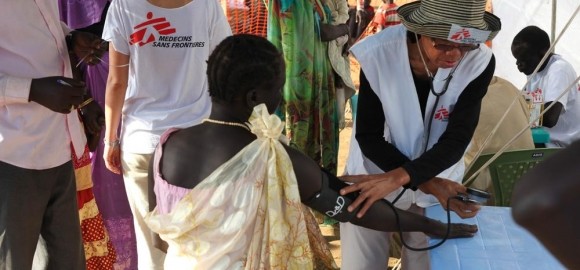Médecins Sans Frontières/Doctors Without Borders (MSF) has more than 3,300 local staff and 350 international staff working in South Sudan and the neighbouring countries as part of its response to the humanitarian crisis.
The emergency medical organization is working in at least 14 locations in the country. Some of the highlights:
Malakal: Providing medical care to 18,000 people living in the United Nations base at Malakal and in the town, including treatment for tuberculosis and kala azar.
Melut: Running primary and secondary healthcare services for 10,000 displaced people.
Bentiu: Providing emergency medical services to the 47,000 displaced people currently living in the UN base in the Unity state capital. This includes an acute therapeutic feeding center and a surgical unit.
Yida: Ongoing operations for the 70,000 refugees in the Yida camp, including a 55-bed inpatient ward and outpatient services.
Awerial: MSF is handing over the hospital it has been running here to the government and other medical actors, after regularly treating 1,300 patients per week.
Pibor: Reopened the health centre, which offers some inpatient services. In the region, teams are conducting as many as 200 medical consultations per day, mainly for diarrhea, malaria, skin diseases and respiratory tract infections.
Yambio: Scaling up response in Yambio, following an increase in malaria among pregnant women and children. MSF has built two new hospitals, which are already full.
In addition, MSF is providing medical services to South Sudanese refugees who have fled to neighboring countries, including Ethiopia and Uganda.




